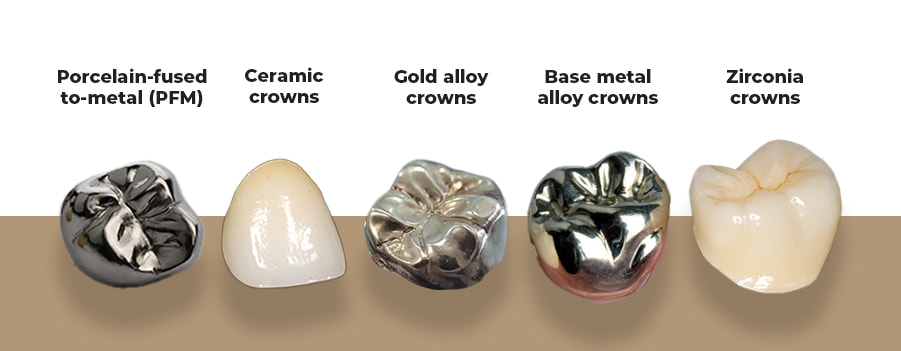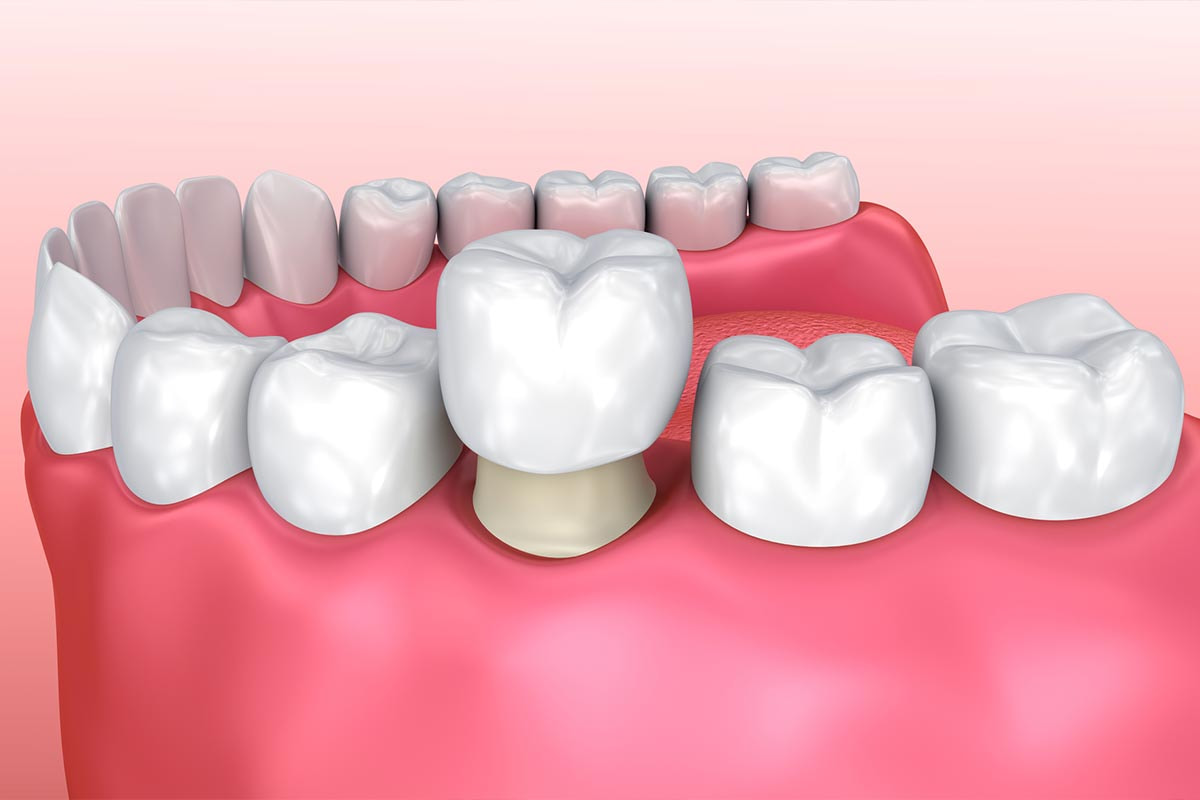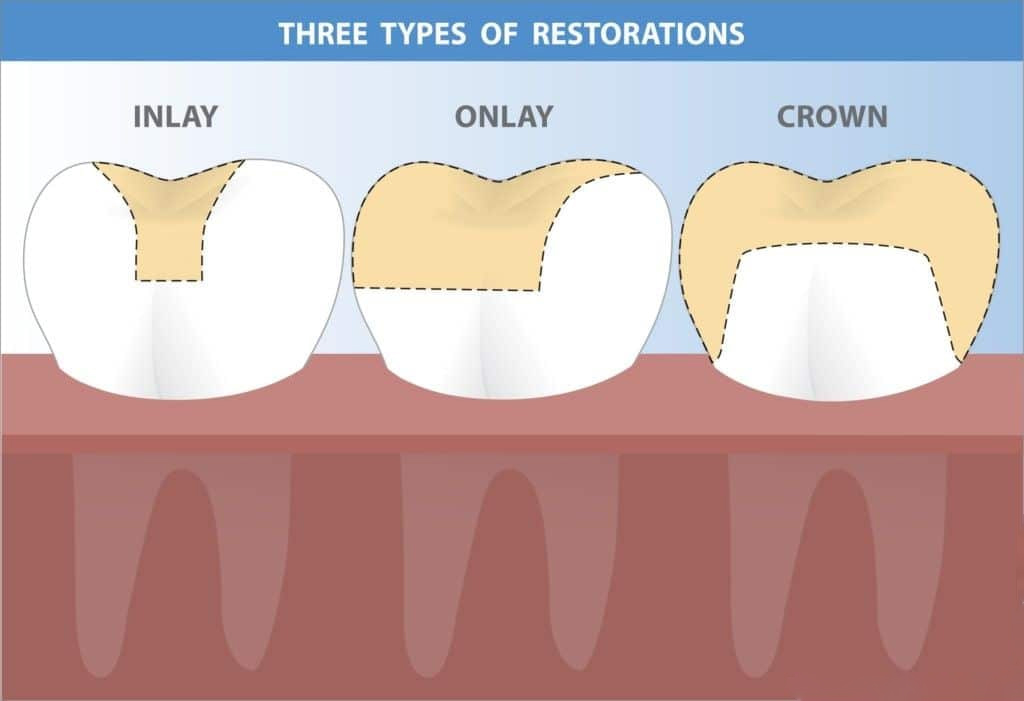A dental crown is a protective cap that is placed over a damaged tooth. It can be crafted from various materials, such as metal or porcelain. Crowns can serve different purposes, such as covering a less visible molar or matching the appearance of front teeth. When considering a dental crown, several factors are important:
– Cost
– Strength
– Durability
– Natural appearance without compromising your smile
Your dentist can discuss the available options and help you determine the best choice for your needs.
Types of Dental Crowns
Dental crowns can be made from different materials, including:
- Porcelain
- Ceramic
- Zirconia
- Meta
- Composite resin
- Comb
- ination of materials
For example, a crown can be porcelain fused to metal or entirely made of porcelain.

During the material selection process, your dentist considers factors such as:
- Tooth location
- Amount of tooth visibility while smiling
- Gum tissue position
- Functionality of the tooth requiring the crown
- Amount of remaining natural tooth
- Color of surrounding teeth
You can also discuss your personal preferences with your dentist. If you don’t have a dentist, the Saigon Center Dental can help you with that.
Temporary Crown
A temporary crown is a short-term solution. It is placed over your tooth using a removable adhesive, making it less durable than a permanent crown.
This temporary crown is used while you wait for the permanent crown to be created. The permanent crown is then placed on your tooth during a subsequent appointment.

One-Day Crown
In a single appointment, you can have a crown placed.
Some dental offices offer same-day crown installation using computer-aided design/computer-aided manufacturing (CAD/CAM) technology.
Your new crown is designed and milled from a ceramic block right there in the office.
Onlay or 3/4 Crown
If a full crown is not required, your dentist might suggest an onlay or 3/4 crown that only covers a portion of the tooth.

Who Needs a Crown?
A crown may be needed if you have:
- A large cavity that cannot be filled
- Severely worn down, cracked, or weakened tooth
- Undergone a root canal treatment, as the tooth becomes more fragile and requires protection
- A missing tooth, and the dentist plans to place a dental bridge or a tooth implant

Dental Crown Costs
According to the Cleveland Clinic, the price of dental crowns can range from $800 to $1,500 or more, depending on the crown material and tooth size.
A gold crown may cost significantly more, possibly up to $2,500, as reported by CostHelper Health.
All-metal crowns, made of a metal alloy, are sometimes less expensive than gold or porcelain crowns.
Costs may increase if additional preparatory procedures are required, such as a root canal or dental implant, both of which can impact the overall price.
Dental insurance may cover part or all of the crown cost, but coverage may vary depending on the type of crown. It’s advisable to check with your insurance provider for coverage details.
Discuss the available crown options and their appropriateness for your dental needs with your dentist to estimate the associated costs.
Dental Crown Procedure
The procedure will depend on whether your dentist chooses a multi-day or same-day approach.
Multi-Day Procedure with Temporary Crown
In a traditional crown procedure, you will need to visit the dentist’s office twice.
- During the first visit, the dentist examines and prepares the tooth that requires the crown. This may involve X-rays and taking a mold of your tooth or mouth.
- Part of the outer layer of the tooth is filed down and removed.
- An impression is made of the trimmed tooth and neighboring teeth.
- A temporary crown is placed over your tooth to protect it.
- The impression is sent to a lab where the permanent crown is created. This step may take several weeks.
- Once the crown is ready, you return for a second visit, during which the dentist cements the crown onto your tooth.
Same-Day Procedure
With a same-day procedure, the temporary crown step is skipped.
- Digital pictures of your mouth are taken by the dentist.
- Using these digital scans, the dentist creates the crown right in the office, utilizing CAD/CAM technology. You may need to wait for approximately 1 to 2 hours while the crown is made.
- Once ready, the crown is cemented into place by your dentist. The entire process typically takes about 2 to 4 hours.
Depending on your specific situation, you might even be able to return to work while waiting for the crown.
It’s important to note that not all dentists have the capability to create same-day crowns. If you lack dental insurance, it’s advisable to inquire with your dentist about the availability and estimated cost of this option.

Dental Crown Care and Possible Complications
Proper care is crucial to maintain the longevity of your dental crown. Here are some useful tips:
- Brush your teeth carefully: Brush your teeth twice a day and consider using a toothpaste for sensitive teeth if your crown or the surrounding teeth are sensitive to temperature changes.
- Floss daily: Regular flossing helps keep your teeth healthy, including the area around the crown.
- Avoid hard foods: Chewing on ice or hard foods can potentially cause your crown, especially porcelain crowns, to chip or crack.
- Use a night guard: If you grind or clench your teeth at night, your dentist might suggest wearing a night guard to protect your crown and other teeth.
When dealing with a temporary crown:
- Handle with care: Be gentle when brushing and flossing around the temporary crown, as the adhesive is not as strong as that used for permanent crowns.
- Be cautious while flossing: Pull the floss out from the side of the tooth rather than snapping it upward to prevent dislodging the temporary crown.
If your temporary crown comes off or breaks, contact your dentist for assistance.

Possible complications that can arise after getting a crown include:
- Teeth sensitivity: Sensitivity to heat or cold is normal, but if your crowned tooth is overly sensitive when biting down, it may indicate a need for adjustments. Discuss this with your dentist.
- Chipped crown: Certain types of crowns, especially all-porcelain crowns, are more prone to chipping. Small chips can often be repaired.
- Loose or dislodged crown: Insufficient cement can cause a crown to become loose or fall out. If you notice any looseness or instability, contact your dentist.
- Allergic reaction: Although rare, some individuals may have an allergic reaction to the metals used in certain crowns.
- Gum disease: Irritation, soreness, or bleeding gums around the crown may indicate the development of gum disease (gingivitis).
The lifespan of dental crowns can range from 5 to 15 years, depending on various factors. While all-ceramic and all-porcelain crowns offer a natural appearance, they may not be as durable as metal or porcelain-fused-to-metal crowns. Gold crowns and porcelain-fused-to-metal crowns generally have longer lifespans.
Your dentist will recommend the most suitable crown type for your specific situation. In some cases, alternative treatments such as veneers or other restorative options may be suggested if a regular filling or crown is not appropriate for your tooth’s condition.

 Google Reviews
Google Reviews Call
Call
SAIGON IMPLANT CENTER
Best dentist in Vietnam
Saigon Implant Center - Dental Clinic utilizes the latest technology for specialized treatment in the field of Single implant, full jaw implants, All on 4 implants, All on 6 implants, Zygoma implant....
SAIGON IMPLANT CENTER
Best dentist in Vietnam
Saigon Implant Center - Dental Clinic utilizes the latest technology for specialized treatment in the field of Single implant, full jaw implants, All on 4 implants, All on 6 implants, Zygoma implant....